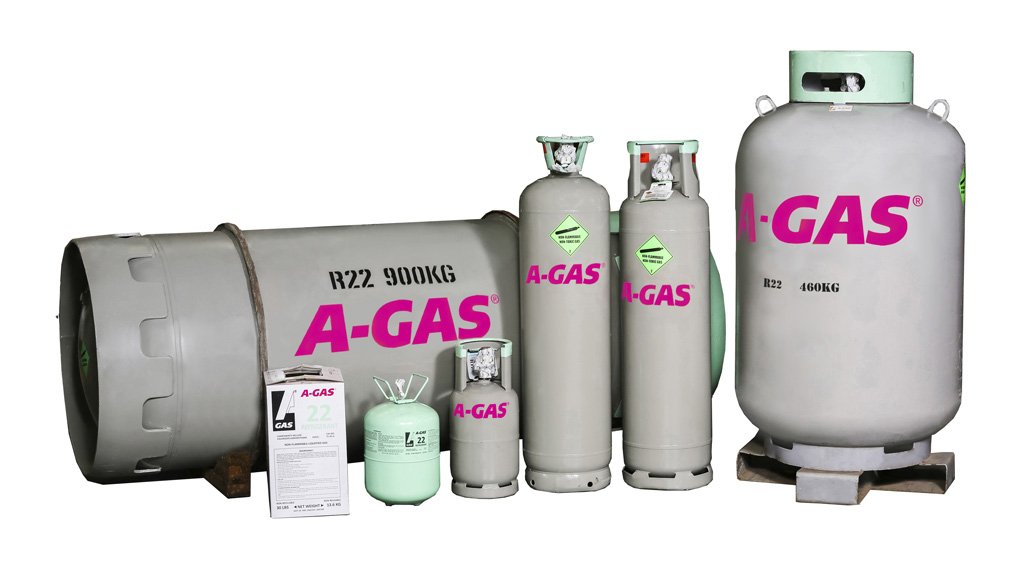Concern regarding standard disposable cylinders


CYLINDER LEGALITIES Chris Phillips explains that there are currently no legalities around the banning of disposable cylinders, however A-Gas continues to lobby the DEA on this topic
Speciality chemicals and gas supplier A-Gas highlights its concern regarding disposable cylinders being used as packaging to import hydrochlorofluorocarbons (HCFCs), hydrofluorocarbons (HFCs), and in some cases, flammable hydrocarbons (HCs), into South Africa.
The company has, therefore, renewed its call for such cylinders to be banned in the South African market, following the banning of HFC refrigerants in disposable cylinders in the European Union (EU), Australia, India and Canada.
“The call to ban disposable cylinders was challenged by the industry last year, as they felt that A-Gas had a different agenda and wanted to control the industry, which is not the case. We are trying to follow the right path in terms of our commitment to the environment as has been done in Europe,” A-Gas South Africa commercial director Chris Phillips states.
A-Gas points out that, owing to the cylinder disposal procedure not being followed properly by users, residual quantities of the refrigerant are being emitted into the atmosphere.
A-Gas national sales manager Michael Labacher reiterates that it would be ideal to not have the problem of disposing of these nonrefillable cylinders. However, he suggests that failing that the responsible way to dispose of these cylinders would be to let an approved compliant facility recover residual gas before the cylinders are destroyed thus eliminating this risk to the environment.
Unfortunately, most end-users regard this process as onerous and costly, and therefore, prefer to dump the cylinders instead, Labacher mentions. The alternative to disposable cylinders is non-disposable cylinders, which is the model that A-Gas was built on.
Phillips further explains that there are currently no legalities around the banning of disposable cylinders, however, the company continues to lobby with the Department of Environmental Affairs on this topic.
Labacher further also explains, that all countries, including South Africa, make use of refillable cylinders. The refillable or returnable cylinders used in South Africa are manufactured to a globally recognized standard and their manufacture, importation, use and revalidation are strictly controlled by the Pressure Equipment Regulations in South Africa.
He further states that these refillable cylinders have a unique serial number, which means they are traceable in terms of the structural integrity of the cylinder and the quality of the product in the cylinder; they have a long life span and, therefore, do not have any significant impact as waste.
Meanwhile, A-Gas submitted an official report ‘Disposable Cylinders – It’s Time to Ban Them’, to the DEA in August 2015. The report refers specifically to disposable cylinders filled with refrigerant that is used to service or commission equipment.
“The A-Gas report argues that regulations and their enforcement are justified and required for environmental and safety reasons, and to ensure a level commercial playing field for all participants,” Labacher adds.
“A-Gas supports the introduction of strict regulations in terms of what products are imported, how much in terms of the phasing out of HCFCs – which is another important topic – and the packaging of such products,” Phillips adds.
He further states that quality control is high on the agenda and that such regulations will eliminate the illegal trade in refrigerants in South Africa.
Since the report was submitted, industry stakeholders and the DEA have been holding quarterly meetings regarding the phasing out, recycling, destroying, importing and quality control of refrigerants in disposable and refillable cylinders.
Should discussions with the stakeholders and DEA result in the banning of disposable cylinders, South Africa will be the first African country to do so and set the standard going forward.
“This would be a great success, as Africa is seen as the dumping ground for inferior products and continues to be the target of trading in disposable cylinders, which ultimately affects the end-user – who is oblivious, but increasingly less so, to its effects on the environment,” Labacher concludes.
Article Enquiry
Email Article
Save Article
Feedback
To advertise email advertising@creamermedia.co.za or click here
Comments
Press Office
Announcements
What's On
Subscribe to improve your user experience...
Option 1 (equivalent of R125 a month):
Receive a weekly copy of Creamer Media's Engineering News & Mining Weekly magazine
(print copy for those in South Africa and e-magazine for those outside of South Africa)
Receive daily email newsletters
Access to full search results
Access archive of magazine back copies
Access to Projects in Progress
Access to ONE Research Report of your choice in PDF format
Option 2 (equivalent of R375 a month):
All benefits from Option 1
PLUS
Access to Creamer Media's Research Channel Africa for ALL Research Reports, in PDF format, on various industrial and mining sectors
including Electricity; Water; Energy Transition; Hydrogen; Roads, Rail and Ports; Coal; Gold; Platinum; Battery Metals; etc.
Already a subscriber?
Forgotten your password?
Receive weekly copy of Creamer Media's Engineering News & Mining Weekly magazine (print copy for those in South Africa and e-magazine for those outside of South Africa)
➕
Recieve daily email newsletters
➕
Access to full search results
➕
Access archive of magazine back copies
➕
Access to Projects in Progress
➕
Access to ONE Research Report of your choice in PDF format
RESEARCH CHANNEL AFRICA
R4500 (equivalent of R375 a month)
SUBSCRIBEAll benefits from Option 1
➕
Access to Creamer Media's Research Channel Africa for ALL Research Reports on various industrial and mining sectors, in PDF format, including on:
Electricity
➕
Water
➕
Energy Transition
➕
Hydrogen
➕
Roads, Rail and Ports
➕
Coal
➕
Gold
➕
Platinum
➕
Battery Metals
➕
etc.
Receive all benefits from Option 1 or Option 2 delivered to numerous people at your company
➕
Multiple User names and Passwords for simultaneous log-ins
➕
Intranet integration access to all in your organisation



















